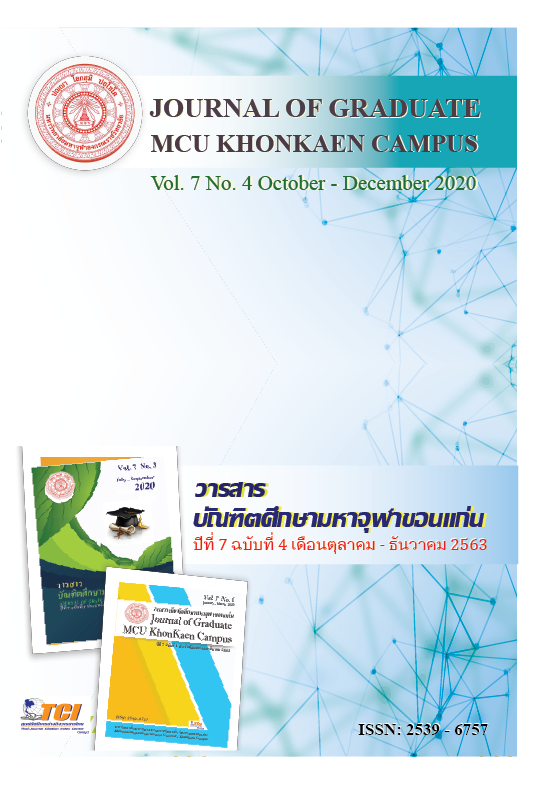GHARÀVÀSA-DHAMMA AND LIFESTYLE OF HEALTH
Main Article Content
Abstract
Health is a condition in which person can express themselves according to social roles. Health makes person able to work as efficiently as possible. Health allows person to adapt to situations and the environment, which is the condition that each person perceives to the current situation. Health makes us feel happy, whether happiness is caused by external happiness or inner happiness that causes person to have a quality of life, optimistic, satisfied with life and complete with physical, mental, emotional, intellectual, social and environmental. The lifestyle of health according to Gharàvàsa-dhamma in Buddhism. The principle of housing; should follow the honesty, not self-esteem rather than the public and understand their importance with influence or role and relationship with others. The principles of living together in the community; should follow the tolerance, trouble solving by peaceful means and know the extent and expression of emotions perfectly. The principle of working successfully should follow patience, not giving up on the problems faced and express opinions and feelings on various matters appropriately. The principles of creating value for themselves, should follow the sacrifice, generous and generous to people. Like this will make living together with reconciliation, reduce conflicts and social problems, cause of sustainable peacefulness in person, communities and society.
Article Details
References
ทวีชัย เชสูงเนิน, ปิยธิดา คูหิรัญญรัตน์. (2554). ความอยู่ดีมีสุขและปัจจัยที่เกี่ยวข้องของผู้สูงอายุที่เป็นสมาชิกสมาคมข้าราชการบำเหน็จบำนาญและผู้สูงอายุ จังหวัดขอนแก่น. วารสารการประชุมวิชาการคณะแพทย์ศาสตร์ มหาวิทยาลัยขอนแก่น.
ธ.ธรรมรักษ์. (2559) หลักฆราวาสธรรม 4 ปฏิบัติตนได้ดี สมหวังในรักดังตั้งใจ, สืบค้นเมื่อ 9 ธันวาคม 2562, จาก https://www.torthammarak.wordpress.com.
บัวพันธ์ พรหมพักพิง. (2549). ความอยู่ดีมีสุข: แนวคิดและประเด็นการศึกษาวิจัย. วารสารมนุษยศาสตร์สังคมศาสตร์ มหาวิทยาลัยขอนแก่น.
ประเวศ วะสี อ้างใน ฉัตรกมล สิงห์น้อย. (2555). เอกสารประกอบการสอนจิตวิทยาการกีฬา เรื่องการสร้างสุขภาพและการมีสุขภาวะที่ดี. สืบค้นเมื่อ 10 ธันวาคม 2562 จาก https://www.scribd.com/doc/3235223 27.
พุทธทาสภิกขุ. (2523). ฆราวาสธรรม. กรุงเทพมหานคร: การพิมพ์พระนคร.
พระพรหมคุณาภรณ์ (ป.อ. ปยุตฺโต). (2551). พัฒนาคุณภาพชีวิตด้วยจิตวิทยาแบบยั่งยืน. กรุงเทพมหานคร: ธรรมสภา.
พระราชวรมุนี (ประยุทธ์ ปยุตฺโต). (2528). คุณธรรมและจริยธรรมสาหรับเด็กและเยาวชนรุ่นใหม่.กรุงเทพมหานคร : จุฬาลงกรณ์มหาวิทยาลัย.
พระพรหมคุณาภรณ์ (ป.อ.ปยุตโต). (2549). สุขภาวะองค์รวมแนวพุทธ สืบค้นเมื่อ 10 ธันวาคม 2562, จาก https://so04.tci-thaijo.org/index.php/jnuks/article/view/90429
รักชนก ชูพิชัย. (2550). ความผาสุกของผู้สูงอายุที่เป็นสมาชิกชมรมผู้สูงอายุโรงพยาบาลพระนั่งเกล้า จังหวัดนนทบุรี. (วิทยานิพนธ์ปริญญามหาบัณฑิต). มหาวิทยาลัยเกษตรศาสตร์. กรุงเทพฯ.
สำนักงานคณะกรรมการพัฒนาการเศรษฐกิจและสังคมแห่งชาติ. (2555). แผนพัฒนาเศรษฐกิจและสังคมแห่งชาติ ฉบับที่ 11 (พ.ศ.2555-2559). กรุงเทพ.
สำนักคณะกรรมการพัฒนาเศรษฐกิจและสังคมแห่งชาติ. (2548). ยุทธศาสตร์แผน 10. กรุงเทพฯ.
หลวงกถิน อัตถโยธิน. (2511). อธิบายธรรมวิภาค น.ธ.ตรี. กรุงเทพมหานคร: ธรรมบรรณาคาร.
Bloggang. (2551). ฆราวาสธรรม. สืบค้นเมื่อ 7 ธันวาคม 2562, จาก http://www.bloggang.com/ mainblog.php?id=you4lucky&month=21-10-2008&group=5&gblog=43.

